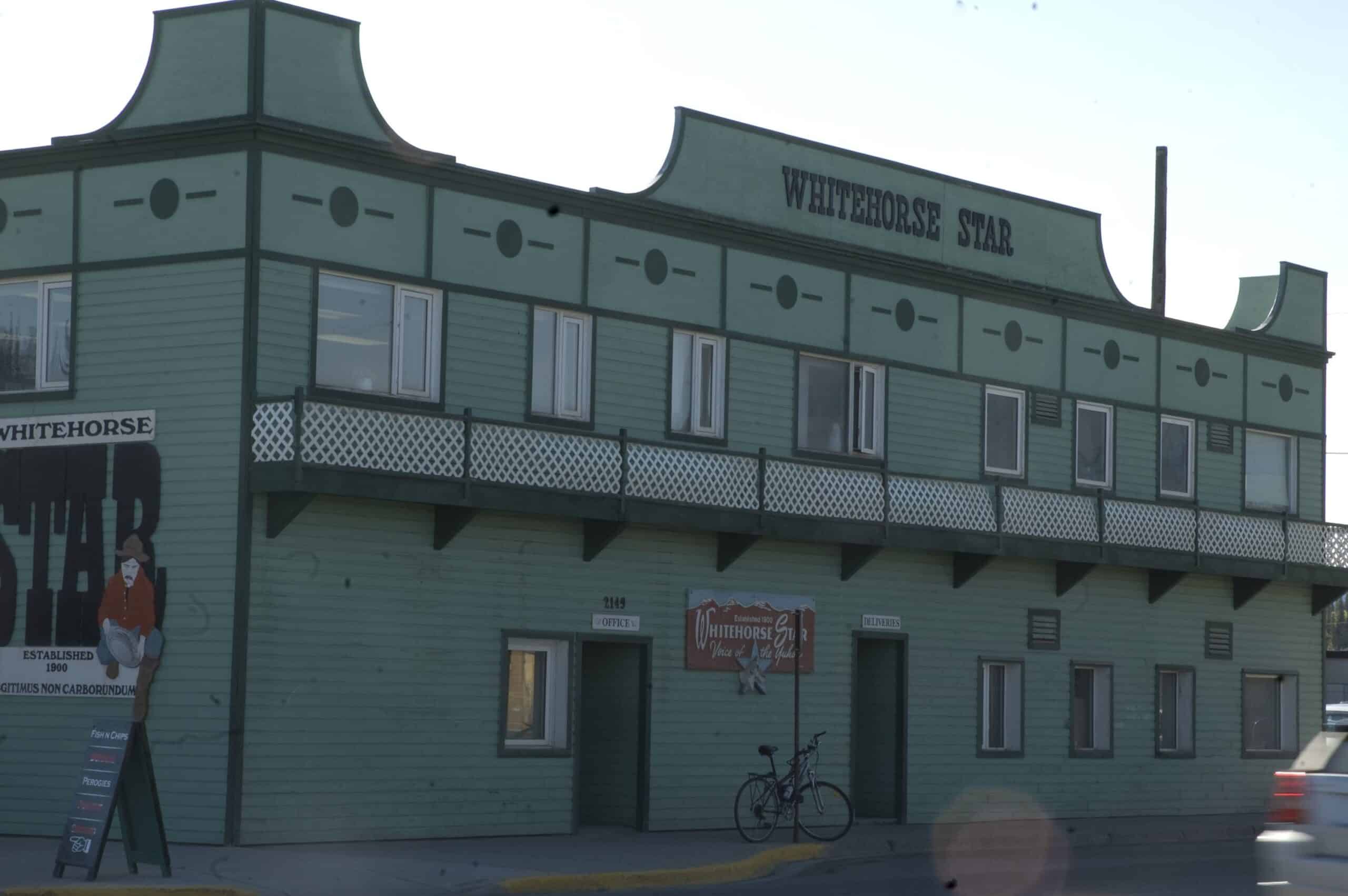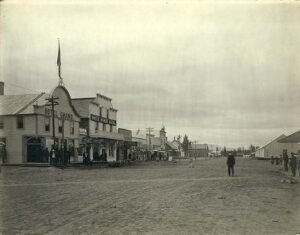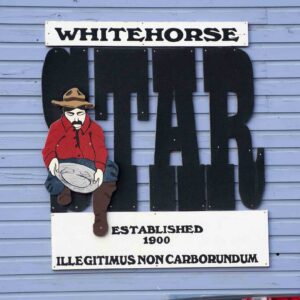Saying Goodbye to an Old Friend: As The Whitehorse Star's 124-Year Run Concludes, its Legacy Continues to Shine Brightly Across the North

The facade of the Whitehorse Star building in Whitehorse, Yukon, whose final edition was published on May 17, 2024 after 124 years. Photo: Jennifer Pack
With the final edition of the Whitehorse Star bringing its long, proud and laudatory century-and-a-quarter run to a close on May 17, 2024, I find my thoughts turning back to my own humble yet recurring contribution to this feisty news institution over the past 35 years. The Star’s indefatigable motto, illegitimus non carborandum, commonly translated as “don’t let the bastards wear you down,” is not only a fitting catchphrase for the spunk and grit of this spirited news daily, but also a guiding philosophy for my life as a journalist, editor and later scholar covering the North since the 1980s.
My first commentary in the Whitehorse Star was published in December 1989, with several more to follow as I overwintered in the Yukon for the first time, living in the capital city of Whitehorse (as discussed in 2021 at The Arctic Institute) in the humble but tidy Baranov Trailer Park, whose namesake famously served as Chief Manager of the Russian-American Company, where I practiced my word craft on a portable manual typewriter beside our ever faithful woodstove as temperatures dipped below minus 40, with my two Alaskan husky cross pups at my feet.
The topics I’ve expressed views on have been wide ranging, from the local to the tribal to the global (and sometimes, all three at once). My first headline that winter included “Operation ‘Just ’cause’” in December 1989 lampooning the US invasion of Panama; followed in January by “AM for PM: From a Local to a Global Voice,” celebrating the rise of Yukoner Audrey McLaughlin as national New Democratic Party (NDP) leader and “Anger and Outrage in the Wake of a Massacre,” articulating my grief at the horrific Montreal Massacre. In February came ”It’s Time We All Slowed Down,” urging Yukoners and other Alaska Highway long-haulers to drive more slowly and safely after my tiny 1977 Toyota long bed, already a battle-hardened veteran of a Dempster Highway rollover, was rear-ended by an American semi-truck hurtling north to Alaska; and “It Might Be Ugly, But So Am I,” taking YTG to task for its unpopular effort to banish the beloved goldpanner from the Yukon license plate in favor of fireweed.
In March came “Restoring the Balance: Justice Comes Back to the Yukon” celebrating the reintroduction of tribal justice to the territory’s hitherto colonial system; “Let’s Save These Native Publications,” calling for a restoration of the Native Communications Program, dedicated to the preservation of Indigenous languages (as discussed in this 2019 article at The Arctic Institute) through a grassroots effort modeled on the successful movement to save the goldpanner; and my final comment of the season, “Punishing an Act of Freedom,” taking Yukon’s by-law officer to task for detaining both of my errant puppies several times at the Whitehorse pound, requiring me to fork over an outrageous amount of money as the fines escalated from $50 to $100 to $300 per offense, per dog for their release – far more than I ever earned writing about it.

I soon found myself further north, in Inuvik, as editor of the Inuvialuit biweekly, Tusaayaksat, a job I got in 1990 in large part because of my first batch of commentaries in the Star and in particular their support of Aboriginal rights. When I became a freelancer once more in August 1993 after falling afoul of the Inuvialuit leadership for reporting on corruption within their land claim implementation, the Star welcomed me back onto its opinion page with “The Doublespeak of Yukon Bureaucrats,” on the tension between majority white Yukon and majority-Indigenous NWT whose residents, to my indignation, were considered by YTG to be Outsiders when it came to job searches, and in June 1994, “Land Claims Hopes and Promise Have Vanished” which looked critically at the then-troubled implementation of the Inuvialuit land claim on the tenth anniversary of its signing.
The Star came back into my life at middle age, as I transitioned from journalist to Arctic scholar in my mid-40s – with “Melting Ice Heralds a New World of Opportunity” in June 2008, celebrating the then widely under-appreciated opportunities of Arctic climate change (the subject of my third book, and bestselling tome, Arctic Doom, Arctic Boom), and with “Torch Has Reinforced Unity Across a Vast Land,” which saw the Olympic torch’s long and meandering journey across Canada’s North as a metaphor for our northern unity in November 2009. Another decade would pass before my next Star comment, in August 2019: “China and ‘Near-Arctic’: A Long-Lost Opportunity.” That was followed in April 2022 by “The World Needs the Arctic Council Now More Than Ever” and in June by a two-parter, “Lack of Consultation Weakens Ottawa Declaration” examining the controversial boycott of Russian participation on the Arctic Council after Moscow invaded Ukraine.

Over thirty years had passed since my first commentaries banged out on my manual typewriter at the Baranov trailer park, and the Star still provided me with a place on its opinion page to share my thoughts and ideas about the ever-changing North. So when I learned of the Star’s imminent closure, I immediately dropped what I was then working on (creating an index for my 14th book since I headed down the path of Arctic scholarship in midlife, Arctic Exceptionalism: Cooperation in a Contested World.) Instead, I turned my attention to one final commentary, a tribute to the Star, dutifully sending each edit to Star editorJim Butler, one of the North’s greatest editors (whom I am quite sure was busy with other pressing matters), just as I had been doing since 1989.After such a long and personal journey expressed on the Star‘s opinion page, I felt the need to say goodbye with one final commentary. It’s where I got my start as a writer. It’s where I found in Butler an editor who saw in my words something worth sharing, no matter where in the North I was, or even when I strayed to the south.
I know I’m now a UConner and not a Yukoner any more, but I just can’t shake my love for this feisty, resilient, scrappy and until now enduring newspaper. I’ll miss it. No matter how you look at it, 124 years is a great run, anywhere, north or south. The Star‘s motto, Illegitimus non carborundum, described above, says it all: “Don’t let the bastards grind you down.” It never did.
Barry Scott Zellen is a Research Scholar in the Department of Geography at UConn. He lived in Whitehorse in 1989-90 as an aspiring freelance writer, and again in 1998-99 as general manager of Northern Native Broadcasting–Yukon (NNBY).